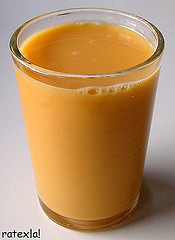
flickr.com/72616463@N00
Lecithin is a component that contributes to the body’s overall health and wellness. The compound is said to be advantageous in everything from treating gallstones to relieving arthritis. However, many individuals choose to take lecithin supplements. Natural lecithin is produced organically in a number of ordinary foods.
History of Lecithin
Also known as phosphatidylcholine (PC), lecithin is a type of phospholipid that presents many benefits. In 1846, the compound was first discovered when a French scientist by the name of Maurice Gobley extracted lecithin from an egg yolk. In 1850, the substance received it’s official name from the word “lekithos”, a Greek term for “egg yolk”. Initially, this new found natural lecithin was derived purely from eggs.
Through the years, the interest in lecithin increased tremendously. There was a boom in soybean consumption in 1930s, and it was discovered that a by-product of soybean processing contained about 1.8% hydrophosphatides consisting of natural organic lecithin. A process, called “degumming”, was created that would extract the natural lecithin from the by-product, and allow it to be commercially sold as an alternative to egg yolks.
Uses of Lecithin
Lecithin is widely used by the commercial food industry as a powerful emulsifying agent, and an additive that can prolong the shelf life of processed foods. Salad dressings, baked goods, chocolates, instant soups, nut butters, candies, protein drinks and other prepared foods contain lecithin. Natural lecithin can also be combined to recipes to enhance flavor and act as an emulsifier.
In general, natural lecithin that comes from plants is regarded as safe. While animal lecithin may contain harmful substances and toxins and are often excreted through the kidneys, you will never face that kind of danger with organic lecithin from plants. As a result, most natural lecithin sold commercially today is obtained from soybeans. Organic lecithin is sold in pharmacies and health food stores in capsule, granule, and pill form. Aside from its role as a natural human supplement, the uses of organic lecithin have also expanded to include animal feeds, cosmetics, paints, and metal tape.
Effects and Advantages of Lecithin
There are many essential functional effects associated with lecithin. First, as an emulsifier, lecithin keeps fat molecules dispersed in food products and keeps oils from separating. Based on these natural emulsifying properties, scientists have discovered that the compound may positively affect those with high cholesterol levels in the blood stream. However, while there is very little evidence to prove that scientific claim, lecithin is still hailed by the commercial food industry for its emulsifying actions. It is possible for manufacturers to use lecithin to reduce the fat content of some foods, while maintaining good flavor.
Organic lecithin sold commercially is composed of a naturally occurring mixture of the ethanolamine, phosphatides choline, and insotil, plus smaller amounts of other lipids. This compound is present in every cell of all living organisms, but is particularly essential in organs such as the liver, in the reproductive tract and in muscles containing high concentrations of phospholipids.
In addition, the effect of natural lecithin on the liver is of particular interest to the medical world. It can help to disperse cholesterol and keep fats in the bile, which is why so many people believe that taking natural lecithin may be a potential treatment for high cholesterol. Of course, lecithin supplements are also sold as a “quick fix” for weight loss.
While it’s not considered to be one of the body’s “essential nutrients”, there is no denying the advantages of natural lecithin. Whether derived from your healthy diet or taken as a supplement, lecithin may provide positive effects for a number of health problems. Consult your doctor if natural lecithin is right for you.
Tagged with: lecithin benefits • lecithin overview
Filed under: Lecithin